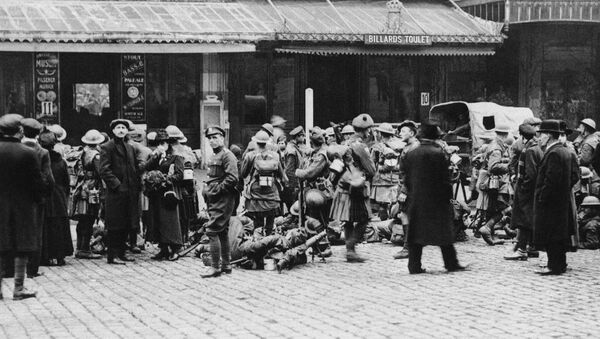Monday, 17 June, is the 100th anniversary of one of the most extraordinary incidents in British history - when hundreds of foreign soldiers rioted in an English town, killing a police officer.
On 17 June 1919 a huge mass of Canadian troops were staying in Woodcote Camp, a military base in Epsom, on the south western outskirts of London.
— Nigel Stickland (@thebestofepsom) 14 June 2019
It had been seven months since the armistice and most of the men were thousands of miles from their homes in Ontario, Quebec or British Columbia and were impatient to be demobilised and sent back to “civvy street”.
With little to do, the soldiers spent much of their time in the town’s pubs and inevitably got drunk and ended up fighting themselves or local people.
On 17 June 1919 two soldiers were arrested by the police after a fight at The Rifleman pub and were taken to the local police station.
Around 400 of their incensed comrades marched to the police station and demanded they be released.
— Epsom&Ewell Council (@EpsomEwellBC) 14 June 2019
A handful of police officers tried to keep the mob at bay. Sticks, stones and bottles were thrown, threats were made to burn the police station down.
Police reinforcements were called for and around a dozen arrived from nearby towns and villages, but were still vastly outnumbered by the Canadians.
Deciding that attack was the best means of defence, Sergeant Thomas Green, 51, and eight other police officers charged at the crowd in an attempt to disperse them.
Sergeant Green was struck on the head with a piece of wood and was carried, unconscious to a nearby house.
The mob had by now surged into the police station and freed one of the Canadians and when Inspector Pawley decided to release the other man the crowd finally went on their way.
— Maclean's Magazine (@macleans) 10 November 2018
But Sergeant Green was mortally wounded and died at 7.10am the following day at the local hospital, having never regained consciousness.
The police ordered all pubs in the area to stop selling alcohol while an inquest was opened into the sergeant’s death.
There was a huge turnout for Sgt Green’s funeral with 800 police officers, dozens of British war veterans, patients from the Horton War Hospital and officers from the Canadian Army paying tribute to him.
Every shop along the route closed and residents drew their curtains and blinds out of respect and stood silently, many dressed in black.
Amid the hundreds of funeral flowers was a wreath from Lord Rosebery, a former prime minister, who lived in Epsom and also gave the other police officers gold watches which bore the legend: “As a token of public appreciation of the gallant fight by the Epsom Police 17th June 1919”
The inquest jury - whose chairman James Chuter Ede coincidentally became Home Secretary in 1945 - returned a verdict of manslaughter against seven Canadian soldiers and commended Inspector Pawley and his officers for their “valour.”
The seven soldiers - who were said to have been led by Allan McMaster, 30, a former blacksmith, were put on trial in Guildford in July 1919 accused of rioting and manslaughter.
They ranged in age from 19-year-old James Connors, a private in the 13th Canadian Highlanders to Robert McAllan, 45, who served in the Canadian Army Medical Corps.
They were acquitted of manslaughter and four were jailed for 12 months each for rioting but were soon pardoned by and sent back to Canada.
— Tim Thurlow (@TrenchTrotter) 12 June 2019
In 1929 McMaster confessed to having landed the fatal blow on Sergeant Green but he could not be tried again because of the law of double jeopardy, which was only abolished in the UK in 2005.
The Epsom riot was a blot on the reputation of the Canadian army but the grudges did not last long and they had been completely forgiven by 1939 when Canada was again Britain's ally against Germany.
The riot focused the British government’s attention on the need to demobilise or repatriate veterans of what was then known as the Great War - later to be the First World War - as soon as possible and within a few months most had been sent back to their home countries or discharged back into civilian life.
To mark the 100th anniversary of the police officer’s death a special beer has been named in his honour by the owner of The Rifleman pub despite the fact that Sergeant Green was teetotal and his death had been caused by drunken Canadians.




